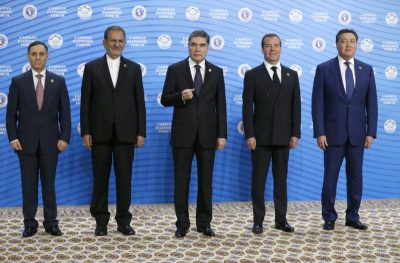Black Sea-Caspian Sea Connectivity Is the Future of Eurasian Integration

This week’s first-ever Caspian Economic Forum in Turkmenistan resulted in the unveiling of an exciting new vision of Eurasian integration through Russian Prime Minister Medvedev’s proposal to prioritize Black Sea-Caspian Sea connectivity.
***
Most of the international media didn’t report on this week’s first-ever Caspian Economic Forum in Turkmenistan, and the most important one that did — CNN — used the event as a pretext for propagating the fearmongering infowar narrative about the host state’s supposedly imminent collapse. Had the world been paying more attention, however, then it would be more widely known that this forum resulted in the unveiling of an exciting new vision of Eurasian integration through Russian Prime Minister Medvedev’s proposal to prioritize Black Sea-Caspian Sea connectivity. He spoke about this urgent need while talking to his Bulgarian counterpart who was also invited to participate in the forum, which is extremely important in more ways than one because the Balkan country is also the irreplaceable transit partner for Russia’s Turkish Stream pipeline to Europe.
Not only that, but Bulgaria is also perfectly positioned to facilitate EU-Caucasus trade because of its location on the opposite side of the Black Sea, which opens up the possibility of connecting it (and by extension, the much larger bloc that it’s a part of) to the trans-Caucasus BTK railroad that represents Turkey’s Silk Road corridor to Central Asia. About that project, it’s the main component of Turkey’s “Middle Corridor” vision of connecting itself with its civlizational cousins in Central Asia en route to China by crossing the Caspian to either Kazakhstan or Turkmenistan at Baku and then proceeding further afield. This trade route would be greatly improved by the accelerated construction of the Uzbekistan-Kyrgyzstan-China railway that the SCO chief spoke about at the Caspian Economic Forum. Although it hasn’t been officially said how far westward this rail project would extend, it’s likely to pass through Turkmenistan in linking up the BTK with the nascent “Central Asian Silk Road”.
Should that end up being the case, then Medvedev’s vision of Black Sea-Caspian Sea connectivity would be complete, which would then bring the EU (through Bulgaria), Turkey, Russia (through Eurasian Union-member state Kyrgyzstan), and China even closer together and therefore fulfill President Putin’s grand strategic plan to expand his country’s trade ties with those three Great Powers. The Central Asian transit states would benefit the most out of this because they’re literally smack dab in the center of this historically recreated Silk Road, thus enabling their governments and people to profit off it by both selling their goods along this route and adding value to the products that pass through it by turning themselves into crucial nodes along this new trans-Eurasian supply chain. EU, Turkish, Russian, and Chinese economic support could in turn contribute to retaining this geostrategic region’s stability and safeguarding their collective security.
It should be pointed out that this branch of the Silk Road simply complements the others that China is pioneering and isn’t intended to replace any of them. The Polar Silk Road through the Arctic, China’s increased use of the Trans-Siberian Railway, the China-Pakistan Economic Corridor, the China-Myanmar Economic Corridor, and the ASEAN Silk Road will still remain viable and useful for facilitating trade with the nearby countries or through the global maritime commons, but this new route through the center of the supercontinent will serve an important purpose in diversifying China’s trade options and thus expanding its contingency planning measures for defending against the US’ Hybrid War on the emerging Multipolar World Order. So long as China can continue to trade with its partners under any scenario — be it by redirecting its trade along land routes in the event of the US Navy disrupting its maritime routes or by focusing more on the sea if US-instigated Color Revolutions make land routes unreliable — then the New Cold War is far from over.
*
Note to readers: please click the share buttons above or below. Forward this article to your email lists. Crosspost on your blog site, internet forums. etc.
This article was originally published on OneWorld.
Andrew Korybko is an American Moscow-based political analyst specializing in the relationship between the US strategy in Afro-Eurasia, China’s One Belt One Road global vision of New Silk Road connectivity, and Hybrid Warfare. He is a frequent contributor to Global Research.
Featured image is from OneWorld

